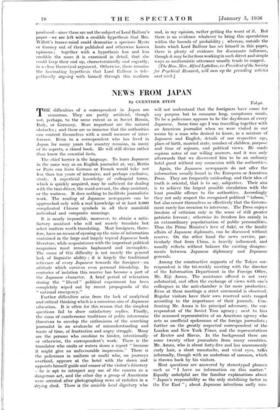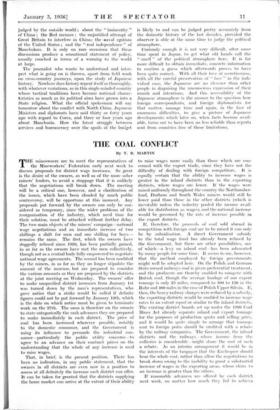NEWS FROM JAPAN
THE difficulties of a correspondent in Japan are numerous. They are partly artificial, though not, perhaps, to the same extent as in Soviet Russia, Italy, or Germany. More important are the natural obstacles ; and these are so immense that the authorities can content themselves with a small measure of inter- ference. Even to a correspondent who has lived in Japan for many years the country remains, in many of its aspects, a closed book. He will still divine rather than know the essential facts.
The chief barrier is the language. To learn Japanese in the same way as an English journalist at, say, Berlin or Paris can learn German or French would take not less than ten years of intensive, and perhaps exclusive, study. A superficial knowledge of colloquial terms, which is quickly acquired, may be sufficient for dealing with the taxi-driver, the maid-servant, the shop assistant, or the waitress. It does nothing to facilitate journalistic work. The reading of Japanese newspapers can be approached only with a real knowledge a at least 3,000 complicated Chinese symbols in all their manifold individual and composite meanings.
It is nearly impossible, moreover, to obtain a satis- factory assistant who will not merely translate but select matters worth translating. Most foreigners, there- fore, have no means of opening up the mine of information contained in the large and largely topical Japanese book literature, while acquaintance with the important political magazines must remain haphazard and incomplete. The cause of this difficulty is not merely the general lack of linguistic ability ; it is largely the traditional reticence of every Japanese towards the foreigner—an attitude which survives even personal friendship. In centuries of isolation this reserve has become a part of the Japanese character. A brief period of relaxation during the " liberal " political experiment has been completely wiped out by recent propaganda of the "national emergency."
Further difficulties arise from the lack of analytical and critical thinking which is a conscious aim of Japanese education- It is often for this reason that the simplest questions fail to draw satisfactory replies. Finally, the mass of cumbersome traditions of polite intercourse ;threatens to envelop the enthusiasm of the searching journalist in an avalanche of misunderstanding and waste of time, of frustration and angry struggle. Many are the persons who combine to hinder, intentionally or otherwise, the correspondent's work. There is the translator who omits or waters down a report "because it might give an unfavourable impression." There is the policeman in uniform or mufti who, on journeys overland, appears at the hotel with the dawn and appoints himself guide and censor of the visitor's itinerary —he is apt to interpret any use of the camera, as a dangerous act, and the other day a group of Americans were arrested after photographing rows of radishes in a drying shed. There is the amiable local dignitary who will not understand that the foreigners have come for any purpose but to consume. long, sumptuous meals. To be a policeman appears to be the daydream of every Japanese. Some time ago I was travelling together with an American journalist when we were visited in our rooms by a man who desired to know, in a mixture of Japanese and English, details of our respective age, place of birth, married state, number of children, purpose and time of sojourn, and political views. He made copious notes of our willing answers, and it was only afterwards that we discovered him to be an ordinary hotel guest without any connexion with the authorities.
Again, the Japanese newspapers do not offer the information usually found in the European or American Press. They are frequently misleading, and their idea. of truth is oriental, that is to say, subjective. Their aim is to achieve the largest possible circulation with the least possible offence to the authorities. Accordingly they not only respect the recognised political "taboos," but also censor themselves so effectively that the Govern- ment rarely has occasion to intervene. The Press enjoys freedom of criticism only in the sense of still greater patriotic fervour ; otherwise its freedom lies mainly in an extraordinary popularisation of public personalities. Thus the Prime Minister's love of Sake, or the family affairs of Japanese diplomats, can be discussed without reserve. On the other hand the news service, par- ticularly that from China, is heavily influenced, and usually reflects without balance the existing disagree- ments between Japanese diplomacy and Japanese generals.
Among the constructive supports of the Tokyo cor- respondent is the tri-weekly meeting with the director of the Information Department in the Foreign Office, Mr. Eiji Amau. The assistance offered is not very substantial, and often the exchange of views with one's colleagues in the anti-chamber is far more productive. Even at these meetings a strict ceremonial is observed. Regular visitors have their own reserved seats ranged according to the importance of their journals. Con- fronting Mr. Amau is his principal adversary, the cor- respondent of the Soviet Tass agency ; next to him the seasoned representative of an American agency who acts as unofficial spokesman of the foreign journalists ; further on the greatly respected correspondent of the London and New York Times, and the representatives of Reuter and Havas. In the background there are some twenty other journalists from many countries. Mr. Amau, who is about forty-five and has uncommonly curly hair, a short moustache, and vivid eyes, talks informally, though with an undertone a sarcasm, which is thrown back by his visitors.
Most questions are answered by stereotyped phrases such as "I have no information on . this matter."
Equally unhelpful are the familiar explanations about "Japan's responsibility as the only stabilising factor in the Far East " ; about Japanese intentions sadly mis- judged by the outside world ; about the " insincerity " of China ; the Red menace ; the unjustified attempt of Great Britain to interfere in China; the aaval egotism of the United States ; and the "real independence" of Manchukuo. It is only on rare occasions that these discussions produce a sensational statement of policy, usually couched in terms of a warning to the world at large.
The journalist who wants to understand and inter- pret what is going on is thrown, apart from field work on cross-country journeys, upon the study of Japanese history. Nowhere does history repeat itself so thoroughly, with whatever variations, as in this single-minded country whose tactical traditions have become national charac- teristics as much as its political aims have grown into a State religion. What the official spokesman will say tomorrow about the conflict with North China, Japanese Ministers and diplomats have said thirty or forty years ago with regard to Corea, and three or four years ago about Manchuria. How the latest struggle between services and bureaucracy over the spoils of the budget is likely to end can be judged pretty accurately from the domestic history of the last decades, provided the observer is able at the same time to judge the political atmosphere.
Curiously enough it is not very difficult, after some time spent in Japan, to get what old hands call the "smell " of the political atmosphere here. It is far more difficult to obtain immediate, concrete information to confirm a guess which afterwards proves to have been quite correct. With all their love of secretiveness, with all the careful preservation of " face " in the indi- vidual case, the Japanese arc no cleverer than other people in disguising the unconscious expression of their moods and intentions. And this accessibility of the Japanese atmosphere is the answer to the question how foreign correspondents, and foreign diplomatists for that matter, manage time and again, in the face of enormous difficulties, to give a picture of Japanese developments which later on, when facts become avail- able, turns out to have been no less reliable than reports sent from countries free of those limitations.











































 Previous page
Previous page